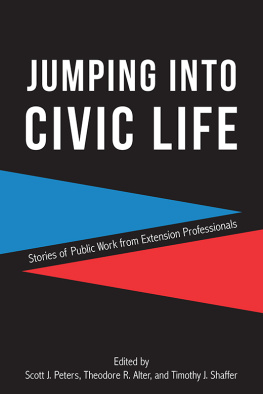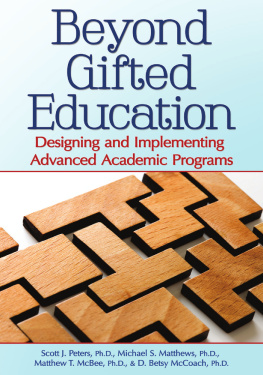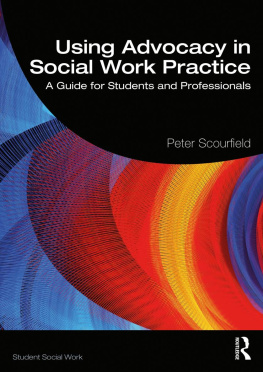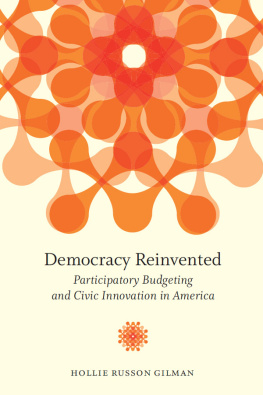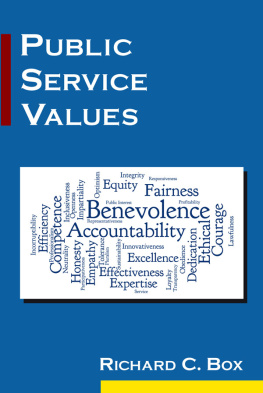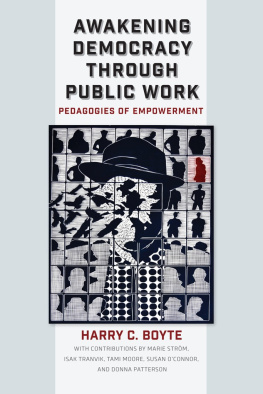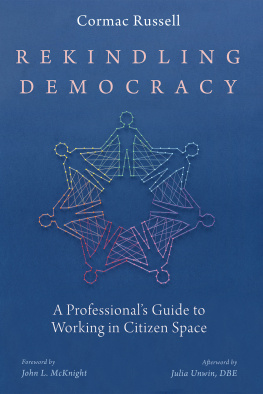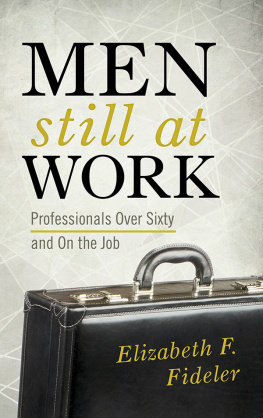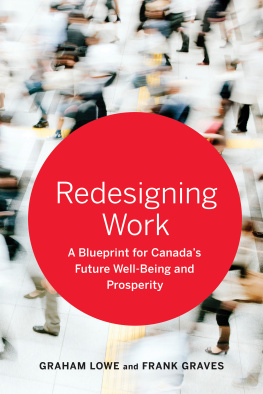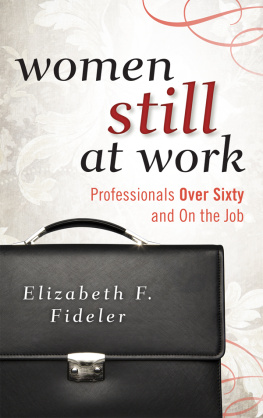JUMPING INTO
CIVIC LIFE
Edited by
Scott J. Peters, Theodore R. Alter, and Timothy J. Shaffer
2018 by the Charles F. Kettering Foundation
ALL RIGHTS RESERVED
Jumping into Civic Life: Stories of Public Work from Extension Professionals is published by the Kettering Foundation Press. The interpretations and conclusions contained in the book represent the views of the authors. They do not necessarily reflect the views of the Charles F. Kettering Foundation, its directors, or its officers.
For information about permission to reproduce selections from this book, write to:
Permissions
Kettering Foundation Press
200 Commons Road
Dayton, Ohio 45459
This book is printed on acid-free paper.
First edition, 2018
Manufactured in the United States of America
ISBN: (print) 978-1-945577-37-6
ISBN: (ePDF) 978-1-945577-38-3
ISBN: (ePUB) 978-1-945577-39-0
Library of Congress Control Number: 2018933682
Cover design by Alyssa M. Gurklis
Artwork on page 106:
Norman Rockwell Visits a County Agent by Norman Rockwell
Printed by permission of the Norman Rockwell Family Agency
Copyright 1948 the Norman Rockwell Family Entities
While I am sure that in the present appreciation of facts we have the most hopeful promise for our confessedly fumbling world, the most needed corrective for certain attitudes of mind into which we have fallen, while I know from experience that we often waste time in conference arguing about things that are ascertainable, still there are several points which must be remembered: it is of equal importance with the discovery of facts to know what to do with them; our job is to apportion, not usurp, function (the people have a place, what is it?); and also we must warn ourselves that a little of the ready reliance on the expert comes from the desire to waive responsibility, comes from the endless evasion of life instead of an honest facing of it. The expert is to many what the priest is, someone who knows absolutely and can tell us what to do. The king, the priest, the expert, have one after the other had our allegiance, but so far as we put any of them in the place of ourselves, we have not a sound society and neither individual nor general progress.
Mary Parker Follett
Creative Experience, 1924
Table of Contents
Foreword
by Alice Diebel
Introduction: Making Democracy Work as It Should
by Scott J. Peters, Theodore R. Alter, and Timothy J. Shaffer
A Historical Note: Farmer Discussion Groups, Citizen-Centered Politics, and Cooperative Extension
by Timothy J. Shaffer
Civic life is difficult. It can also be frustrating, painful, and risky. Given these realities, why do people jump into it?
One answer is that they are compelled to do so, by anger or love. Or more likely, by both. While people may jump into civic life out of anger, their anger usually emerges from a sense that someone or something they love is being harmed or disrespected.
Thats certainly the case with us. As academic professionals, we have jumped into civic lifeboth on and off our campusesout of anger over the ways that people, places, and processes we love are being harmed or disrespected. This book is one product of our work as publicly engaged scholars. Since such work is inherently collaborative, we owe many people acknowledgments of gratitude for their contributions, support, and inspiration.
First, we want to express our gratitude for the stories, insights, and wisdom we were fortunate to hear and receive from dozens of our Extension and land-grant colleagues who participated with us in the Kettering Foundation research exchanges that led to the publication of this book. The time we spent together included a good deal of truth-telling, much of which was troubling and challenging. Thankfully, we managed to keep our main focus on promising possibilities, revealed through first-person stories of their (and our) lives and work. Together we generated more than a thousand pages of transcripts of such stories that we will continue to draw on and learn from for years to come. We are especially grateful that eight of our Extension colleagues were willing to have their stories published. We thank Carmen DeRusha, Janet Ayres, Joe Sumners, Katrina Easley, Bill McGowan, Daryl Buchholz, Sue Williams, and Jan Hartough for their generosity and boldness. Their voices and stories will remain with us always, as sources of inspiration and hope.
Second, we are deeply grateful for the support and encouragement we received from the Kettering Foundation, especially senior associate Alice Diebel. We owe Alice more than we probably know, not only for believing in our projectwhich is much larger than this book, and will include many more productsbut also for contributing to it in many substantive ways, and for putting up with it and us as our timeframe for completion stretched out much longer than we originally anticipated. We deeply value the time we spent with her. With respect to the Kettering Foundation itself, we feel compelled to speak a truth: it is the only organization in the entire country that offers sustained opportunities for Extension and land-grant professionals to explore the civic dimensions of their work. It would be impossible for us to overemphasize how important that has been, and still is.
Finally, we owe an unpayable debt of gratitude to a set of Extension and land-grant leaders from the 19th and 20th centuries whose bold democratic vision continues to inspire and agitate us every day. Liberty Hyde Bailey, Minnie Price, Ruby Green Smith, M. L. Wilson, and countless others from those centuries were the original citizen professionals in the Extension and land-grant system. Like us, their lives and work werent perfect. But they managed to establish a democratic tradition in our institutions, and gave us standards we strive to honor. Their civic commitments and aspirations live on, as the stories you will read in this book reveal. May they always.
This book is a remarkable testament to the confidence its storytellers have in the people who live in the communities they serve. These stories are of Cooperative Extension agentsor educators, as they are now often referred toand leaders who recognize that people have the inherent capacity to make significant differences in their collective lives. The authors of these narratives are pushing against the norm in Cooperative Extension, an institution that typically recognizes its role in the research university as that of transferring technical information to citizens, or of applying proven programs to communities. Unlike much of Cooperative Extension and other university systems, these authors recognize that difficult and persistent community problems are not easily addressed without citizens, and that applying a technical fix to people limits creative alternatives and further pushes citizens out of public life. What role is there for citizens if an expert has the answers? These democratically spirited agents have learned that they do not have all the answers and see their role as facilitating the public engagement of issues using a myriad of approaches to deal with the many problems of living in community.
The challenge, as the Kettering Foundation sees it, is that too often university outreach efforts come from an expert position bringing

